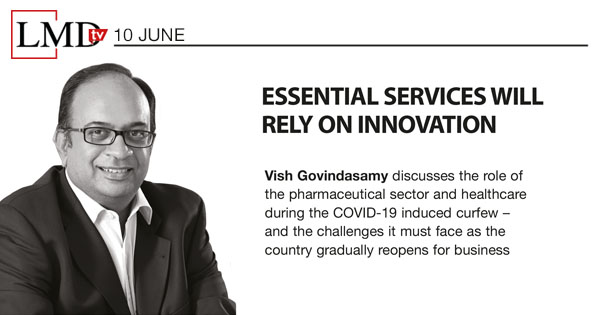The Group Managing Director of Sunshine Holdings Vish Govindasamy said on LMDtv not long ago that “the experience of the pharmaceutical sector has been no different to those of other sectors – but it happens to offer essential items.”
“People needed their medication so we had to ensure that those items were delivered during the islandwide curfew,” he told LMD’s Anushan Selvarajah.
He continued: “Similarly, we had to ensure that government hospitals received all the items they required – i.e. testing and laboratory equipment.” Additionally, the sector obtained permission to operate pharmacies during this period.
“Therefore, while the pharma sector faced the same difficulties as others in terms of operating and logistics, we owed it to the nation to ensure that these items were available throughout the crisis as we provide an essential service,” he posited.
Despite the necessity of the sector’s operations, he observed that it did not perform as it would have under ordinary circumstances.
With the curfew limiting people’s movements, those in the sector were driven to employ new methods to reach customers such as e-commerce platforms. However, Govindasamy stated that the number of orders received had declined.
“One would think that people would adjust to e-commerce platforms instead of waiting in line to enter stores but they seem to prefer this to placing orders online and waiting for deliveries to their homes,” he revealed.
And he noted that prior to the pandemic, pharmaceutical firms had been vocal about the non-payment of outstanding bills by the state sector, which is an issue that has persisted.
To address this, the sector recommended that the government shift to an e-procurement platform when purchasing pharmaceutical items for the Ministry of Health to ensure a transparent tender process while also affording it the ability to better assess demand and supply.
As for self-sufficiency in the local context, Govindasamy pointed out that this would be a difficult undertaking for businesses as the sector’s operations are not very different to the apparel industry.
“For pharma businesses, exporting is a major challenge as with the exception of labour, everything must be imported – from the machinery to the packaging material, to the active pharmaceutical ingredients (API) – and we combine them,” he disclosed.
In contrast, neighbouring countries such as Bangladesh, India and Pakistan possess more purchasing power due to their large populations.
When it comes to Sri Lanka’s level of preparedness for another health crisis, Govindasamy emphasised the need for more investment in the healthcare sector despite it being among the best in the region in terms of providing free care for the entire population.
“Unfortunately, not much attention has been focussed on this sector because of bureaucracy and other factors,” he charged, explaining that the state sector counts for some 500 ICU beds in its portfolio.
While acknowledging that the sector was able to respond well to the COVID-19 outbreak, he emphasised that “going forward, we must be more prepared in terms of investments – so we need more hospital beds, doctors and specialists.”
Highlighting opportunities resulting from the pandemic, he said: “Over these recent months, many people were able to consult with their doctors online for routine problems.” To this end, he called for collaboration between the pharma sector and higher education institutes to upgrade Sri Lanka’s healthcare system and the delivery of medicine to patients.
Govindasamy shed light on the uncertainty that the pharmaceutical sector faces as a result of lockdowns in countries such as India, Pakistan and China affecting procurement processes.
“Over the next six months, the challenge will be obtaining the products we need after which delivery will not be an issue,” he explained, adding that the next six months “will be more uphill than the initial six months.”




